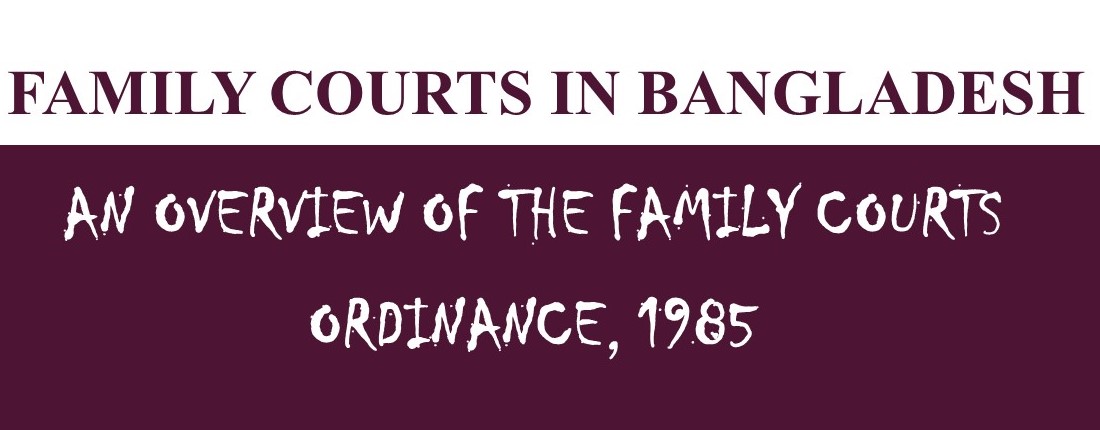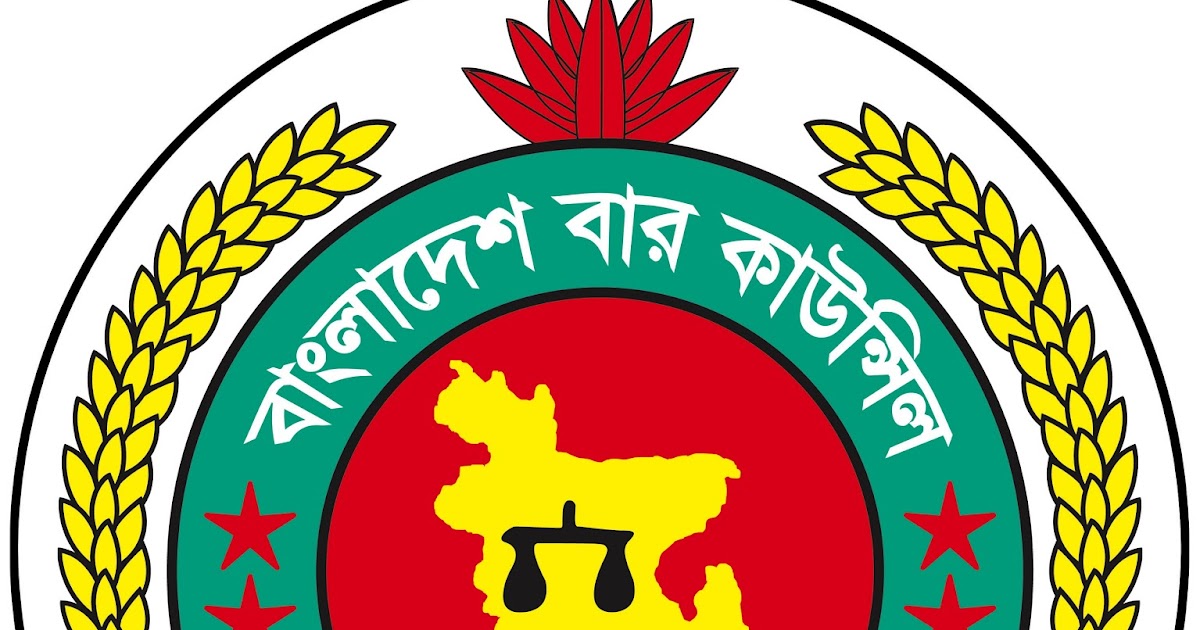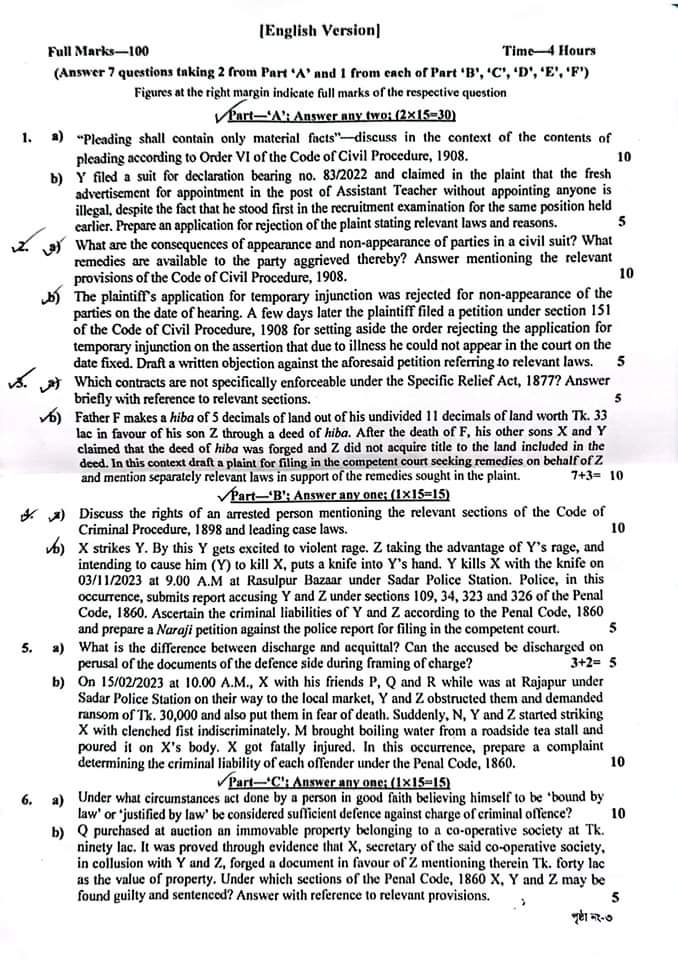Family Courts in Bangladesh
Family Courts:
Black’s
Law Dictionary defines Family Court as such:
“The court that
hears matters relating to members of a family.”
Family court is a court that has jurisdiction over domestic disputes involving the rights and duties of husband, wife, parent, or child especially in matters affecting the support, custody, and welfare of children. It can further be defined as a court of law that hears cases involving domestic issues such as marriage, divorce and child custody. It is a court of special nature (Special Court). In Bangladesh Family Courts are established regulated under the Family Courts Ordinance, 1985 which contains 27 sections.
Establishment:
Section 4 of the Family Courts
Ordinance, 1985 establishes the Family Courts and reads as such:
“(1) There
shall be as many Family Courts as there are Courts of [Assistant
Judges].
(2) All Courts of [Assistant Judges] shall be Family Courts for the purposes
of this Ordinance.
(3) All [Assistant Judges] shall be the Judges of Family Courts.
Accordingly, All the Assistant Judges Courts are the Family Courts in Bangladesh within the meaning of this section. Here the question lies regarding the capability of the judges of family courts who are the least experienced and newly appointed in the service whereas in India and Pakistan judges require comparatively compatible experience to hold the position.
Jurisdiction:
Section 5 of the Family Court Ordinance, 1985 provides the provisions relating to the jurisdiction of the Family Courts which reads as follows:
"Subject to the provisions of the Muslim Family Laws Ordinance, 1961 (VII of 1961), a Family Court shall have exclusive jurisdiction to entertain, try and dispose of any suit relating to, or arising out of, all or any of the following matters, namely:-
(a) dissolution of marriage;
(b) restitution of conjugal rights‘
(c) dower;
(d) maintenance;
(e) guardianship and custody of children.“
It is to
be noted here that A Family Court shall be deemed to
be district court for the purpose of the Guardians and Wards Act, 1890 and an
appeal shall lie to the Court of District Judge (Section 24 & Section 17)
Dispute regarding the access to the family courts has been prevalent since its enactment. Section 5 containing the words “Subject to the provisions of the Muslim Family Laws Ordinance, 1961 (VIII of 1961)” emerged the distinguishing point as to whether only Muslims can go to Family Courts or every citizen can do so for the enforcement of their legal rights relating to family matters. The Supreme Court of Bangladesh has held several decisions regarding the matter which are contradictory with each other.
In Krishnapada Talukder V.
Geetasree Talukder [14 (1994) BLD 415] the question was whether a
woman, Hindu by faith, could file a suit in a Family Court for maintenance
against her husband. The honourable justice of the High Court Division held
that
"As per the provisions of the present Ordinance, all the sections of the 27 sections statute have been made available for the litigants who are Muslim by faith only."
But in Nirmal Kanti Das Vs Sreemati Biva
Rani [14 (1994) BLD (HCD) 413], the High Court Division expressed totally
opposite view. From the expression 'other laws', in section 3 it appears that
the Family Court Ordinance controls the Muslim Family Laws Ordinance, 1961, and
not vice versa. Thus, any person
professing any faith has a right to bring a suit for settlement and disposal of
disputes relating to dissolution of marriage, restitution of conjugal rights,
dower, maintenance, guardianship and custody of children. However, a Hindu wife
is entitled to bring a suit for maintenance against her husband in a Family
Court.
Finally,
Pochon Rikssi Das Vs Khuku Rani Dasi and
others [50 (1998) DLR (HCD) 47]
removed all the confusions and held that:
"the Family Court Ordinance has not taken away any
personal right of any litigant of any faith.....Family Courts Ordinance applies
to all citizens irrespective of religion.”
Family courts Ordinance, 1985 being
a special law overrides the Code of Civil procedure about what is contained in
the Act directly but CPC will apply in cases where the ordinance is salient. In
Family Courts the proceeding is initiated with the presentation of plaint by
the plaintiff under section 6 of the Ordinance. The defendant, after being
noticed within the meaning of section 7 of the ordinance, shall have to appear before
the Family Court and file written statement under section 8 within 30 (thirty)
days from the date of filing the suit. But, on the application of the defendant,
the court may fix a further date not beyond twenty-one days for the
presentation of the written statement of his defense.
Section 9 deals with the consequence of non-appearance of parties. Accordingly, if, on the day called on for hearing, neither the plaintiff nor the defendant appears in the court, the Court may dismiss the suit. Again, if the defendant does not appear in the court and the notice is duly served, the court may proceed the hearing ex-parte and a further notice can be directed to be served, if it is not proved that the notice has been duly served. The court may also extend for 21 days for appearance, if the notice is served but the defendant does not have enough time to appear before the Family Court. Furthermore, where the defendant appears and the plaintiff does not appear, on the day of hearing the Court shall dismiss the suit, unless the defendant admits the claim or part thereof.
A special feature has been laid down by section 11 that a Family Court may, if it so deems fit, hold the whole or any part of the proceedings under this Ordinance in camera. But where the both the parties request to hold the proceeding in camera, the court shall do so.
Alternative Dispute Resolution (ADR) does mean a alternative
way to settle the dispute out of ordinary court procedure. There are four types
of ADR namely negotiation, mediation, conciliation and arbitration. FCO, 1985
embodies two types of ADR e.g. negotiation and mediation. Section 10(3) deals
with ADR in Pre-trial stage and says:
“At the pre-trial hearing, the Court shall ascertain the points at issue
between the parties and attempt to effect a compromise or reconciliation
between the parties, if this be possible.”
Section 13(1) deals with ADR in
Post-trial stage and puts it thus:
“After the close of evidence of all parties, the Family Court shall make another effort to effect a compromise or reconciliation between the parties.”
Presiding judge can be the mediator for this ADR purpose. In case the parties fail to settle the dispute by reconciliation or compromise, the proceeding will be restituted in normal proceeding.
Compromise decree (Section 14): Where a dispute is settled by compromise or conciliation, the Court shall pass a decree or give decision in the suit in terms of the compromise or conciliation agreed to between the parties.
Besides FCO, 1985, in family matters Muslim Family Laws
Ordinance also introduced the option of ADR out of court proceeding. Muslim Family Laws
Ordinance, 1961 contains arbitration as a form of ADR. The Chairman of Union Porishad or Councilor in city corporation
area are the arbitrators. Following
sections give option of arbitration in five matters i.e., Polygamy (Section 6), Talaq
(Section 7), Dissolution of marriage otherwise than by talaq (Section 8), Maintenance
(Section 9) and Dower (Section 10).
Section 17 provides rule regarding appeal from the decree and order given by Family Courts and reads as follows:
(1) Subject to the provisions of sub-section, an appeal shall lie from a judgment, decree or order of a Family Court to the Court of District Judge.
(2) No appeal shall lie from a decree passed by a Family Court-
(a) for dissolution of marriage,
except in the case of dissolution for reasons specified in section 2 (viii)(d)
of the Dissolution of Muslim Marriages Act, 1939 (VIII of 1939);
(b) for dower not exceeding five thousand taka.
(3) An appeal under this section shall be preferred within thirty days of the passing of the judgment, decree or order excluding the time required for obtaining copies thereof:
Provided that the Court of District
Judge may, for sufficient cause, extend the said period.
(4) An appeal shall-
(a) be in writing;
(b) set out the grounds on which the appellant seeks to challenge the judgment,
decree or order;
(c) contain the names, description and addresses of the parties; and
(d) bear the signature of the appellant.
(5) A certified copy of the judgment, decree or order of the
Court from which the appeal is preferred shall be attached with the appeal.
(6) Any order passed by the Court of District Judge shall,
as soon as may be, be communicated to the Family Court which shall modify or amend the judgment, decree or order accordingly and shall also make necessary entries to that
effect in the appropriate column in the register of decrees.
(7) The District Judge may transfer an appeal to the Court
of an Additional District Judge or a Subordinate Judge for hearing and disposal and may withdraw any such appeal form such Court.
Other important provisions of the Family Courts Ordinance 1985 include:
(1) Every judgment or order of a Family
Court shall be written by the presiding Judge or from the dictation of such
Judge in the language of the Court and shall be dated and signed by the Judge
in open Court at the time of pronouncing it.
(2) All judgments and orders which are
appealable shall contain the point for determination, the decision thereon and
the reasons therefore.”
Section: 16. Enforcement of decrees: The Family Court may enforce its
decree in such form and manner as it thinks fit.
Section: 16A. Interim order by Family Courts: Where, at any stage of a suit, the Family Court is satisfied by affidavit or otherwise, that immediate action should be taken for preventing any party from frustrating the purpose of the suit, it may make such interim order as it deems fit.
Section: 18. Power of Family Court to summon witnesses: A Family Court may issue summons to any person to appear and give evidence, or to produce or cause the production of any document subject to conditions contained in this section.
Section: 19. Contempt of Family Courts: The Family Court may sentence a person who is proved to be guilty of its contempt, to fine not exceeding two hundred taka.
Section: 20. Application and non-application of certain laws: Unless otherwise expressly provided by the Ordinance, the following laws shall not apply to proceedings before the Family Courts:
(1)
The provisions of the Evidence Act,
1872 (I of 1872), and of the Code of Civil Procedure, 1908 (except sections 10
and 11)
(2) The Oaths Act, 1873 (X of 1873)
Section: 21. Appearance through agents: With the permission of Family Court, a pardanishin woman can appear through her agents.
Section: 22. Court-fee: 25 taka has to be paid as court fees for filing any kind of suit before Family Courts.
Section: 23. Ordinance VIII of 1961 not affected:
“(1) Nothing in this Ordinance shall be deemed to affect any of the provisions of the Muslim Family Laws Ordinance, 1961 (VIII of 1961), or the rules made thereunder.
(2) Where a Family Court passes a decree for the dissolution of a marriage solemnised under the Muslim Law, the Court shall, within seven days of the passing of the decree, send by registered post a certified copy of the same to the appropriate Chairman referred to in section 7 of the Muslim Family Laws Ordinance, 1961 (VIII of 1961), and upon receipt of such copy, the Chairman shall proceed as if he had received an intimation of talaq required to be given under the said Ordinance.
(3) A decree passed by a Family Court for the dissolution of a marriage solemnised under the Muslim Law shall-
(a) not be effective until the expiration of ninety days from the day on which a copy thereof has been received under sub-section (2) by the Chairman; and
(b) be of no effect if within the period specified in clause (a) a reconciliation has been effected between the parties in accordance with the provisions of the Muslim Family Laws Ordinance, 1961 (VIII of 1961).”
Section:
24: Family Courts are deemed to be a
District Court for purposes of Act
VIII of 1890 i.e., The Guardians and Wards Act, 1890.
Section: 25. Transfer and stay of suits and appeals: The High Court Division or the District Court either on the application of any party or of their own accord may transfer a suit form one family court to another.
Section:
26. Power to make rules: “The
Government may, by notification in the official Gazette, make rules for
carrying out the purposes of this Ordinance.”
Section:
27. Provisions relating to pending cases: Notwithstanding
anything contained in this Ordinance, all suits, appeals and other legal
proceedings relating to, or arising out of, any of the matters specified in
section 5 pending in any Court immediately before the commencement of this
Ordinance shall continue in the same Court and shall be heard and disposed of
by that respective Court as if this Ordinance had not been made.






